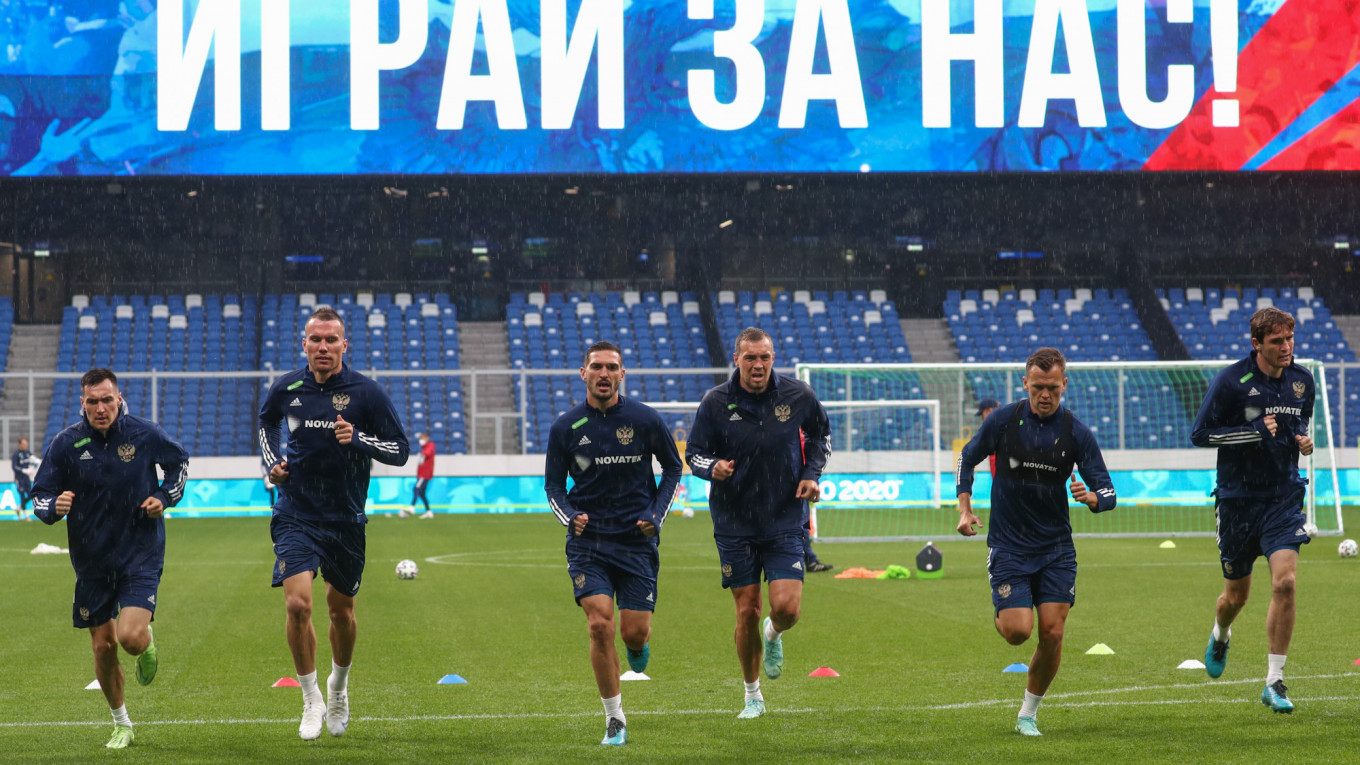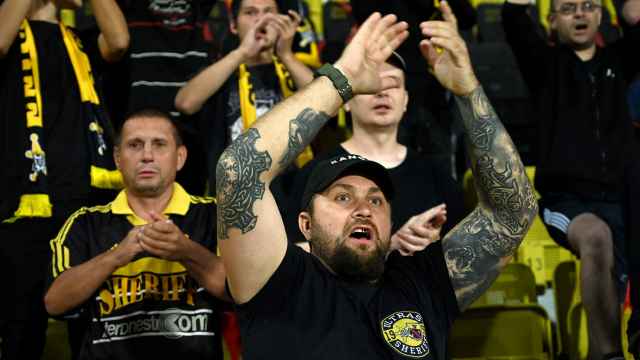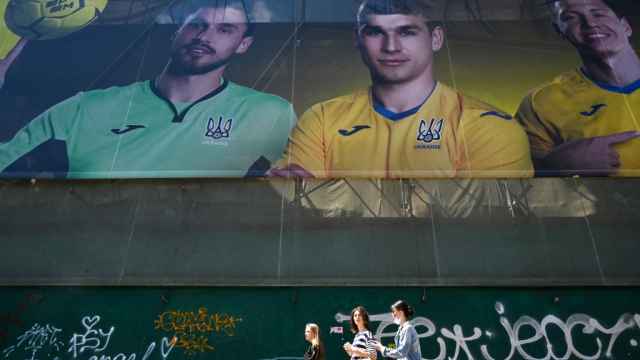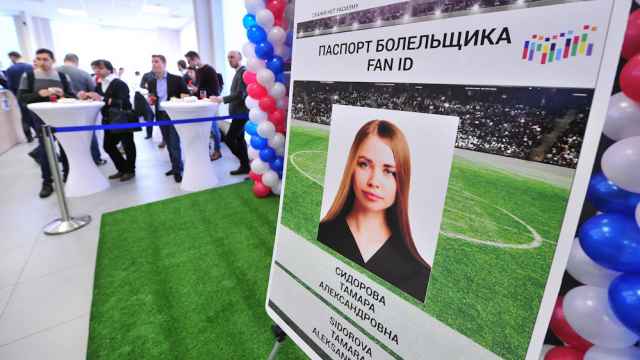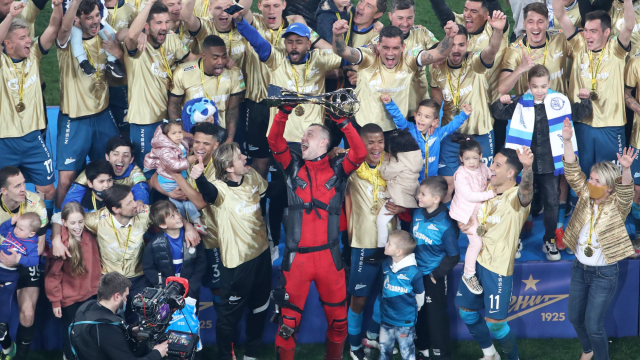Three years ago, scenes of euphoria erupted in Moscow’s Luzhniki Stadium and all over Russia after Igor Akinfeev saved two penalty spot kicks to beat Spain 4-3 and take World Cup hosts Russia through to the quarter-finals for the first time since the Soviet era.
Russia would eventually lose to Croatia in the quarter-finals, but as delirious fans thronged the capital’s streets, many hoped Russia’s triumphant World Cup would act as a trigger for future successes.
On the eve of the team’s first game in the Euro 2020 tournament, things look very different.
“Like a summer romance, the high we felt has since faded and reality has sunk in,” said Dmitriy Egorov, a Russian football pundit.
He pointed to disappointing performances in the latest Europe’s Nations League, where Russia finished second behind Hungary, while overall the country only won two of its eight games in 2020.
“We have seen some of our leaders leave and not replaced properly. The team doesn’t have the quality to compete with the best teams right now,” Egorov said.
As one of the oldest teams competing in the 2018 World Cup, Russia had to restructure. The veteran center-back Sergei Ignashevich, Akinfeev, and the winger Aleksandr Samedov were three of the key players who retired.
Russia will be hoping to rely on the experience of those that have stayed on for what is likely their last tournament.
The team’s frontline will be led by talisman striker and captain Artyom Dzyuba, 32, who was briefly excluded from the squad last November after a video appearing to show him masturbating went viral. Dzyuba received widespread support from the general public and Russian celebrities and was soon reinstated as captain.
International fans will also recognize former Chelsea full-back Yuri Zhirkov, 37, who will be playing in his fifth major international tournament.
Much of Russia’s success, football watchers say, will depend on the form of its two most creative players Alexander Golovin and Aleksei Miranchuk. The two attacking midfielders have, however, yet to make a major impact in Europe where they play for Monaco in France and Atalanta in Italy.
Drawn in a group with Denmark and the first-time participants Finland, Russia will be aiming to qualify behind one of the tournament’s favorites, Belgium, who they face first on Saturday.
The tournament, postponed by a year due to Covid-19, will run in an unusual format from June 11 to July 11 across 11 host cities, including seven games in Saint Petersburg, which will also host a quarter-final.
Vasili Utkin, a veteran Russian sports analyst and popular video blogger, believes the tournament’s delay did not work in Russia’s favor.
“Some of our best players would have peaked last year and now are a little over the top. We are seeing a generational transition,” he said.
At the same time, Utkin said, Russia’s enigmatic coach Stanislav Chersesov and his staff have “a special talent” for getting the most from a team during big international tournaments
“We all remember our disastrous preparation for the World Cup,” he said.
Back then, Russia was heading into the tournament on the back of a seven-game winless streak.
“The staff has a gift of squeezing everything there is out of this team when it matters. Nothing can be excluded,” he added.
Russia will be boosted by the fact that it will be hosting two of its group games against Belgium and Finland at home. St. Petersburg was initially scheduled to host only three group stage matches and one quarter-final.
But UEFA relocated three games to Russia’s second city after authorities in the Spanish city of Bilbao and the Irish capital Dublin could not give guarantees of welcoming enough fans to stadiums.
Russia, which has not gone back into lockdown after lifting most restrictions last summer, has vouched to fill its stadiums to 50% capacity and allow football fans from across the globe to attend the championship without a visa, despite growing signs the country is experiencing a third Covid-19 wave.
As the tournament approaches, St. Petersburg is threatening to gain the dubious title of host city with the highest per capita infection rate.
In contrast, Denmark, where Russia will be playing its third game, has already announced that Russian fans will not be welcome in Copenhagen due to Covid restrictions.
Post World Cup decline?
Critics inside and outside Russia feared that state-of-the-art sports facilities, which cost around $3.45 billion and made the 2018 World Cup the most expensive football competition in history, would turn into so-called white elephants after the final whistle.
While stadiums in Moscow and St Petersburg did see a boost in attendance between the end of the tournament and the start of the pandemic, venues located in the regions struggled to follow suit.
The stadium in Nizhny Novgorod, a city 400 kilometers east of Moscow, saw average attendance of just 7,000 in 2019, less than most second division European leagues.
Utkin said it is too early to draw conclusions about the long-term effects of the World Cup as not enough time had passed.
A bigger issue, he said, is growing financial difficulties faced by many of Russia’s Premier League teams due to general mismanagement and the pandemic forcing them to cut their budgets.
As a result, Russian club sides playing in Europe haven't seen much success lately, with disastrous campaigns over the last two years as the country dropped two spots in the European club ranking to 8th, behind The Netherlands and Portugal.
The lack of investment also means Russia’s youth development systems remain underfunded and focused on winning rather than developing players, said Egorov.
Few youth players made Chersesov’s final squad for the tournament, with the expectation of 18-year-old playmaker Arsen Zakharyan. Zakharyan, born to Armenian refugees, is seen as one of the country’s most promising talents.
The build-up Euro 2020 has been somewhat overshadowed by politics, after Kiev provoked Moscow's ire by unveiling kits showing the outline of Ukraine including Crimea, which Russia illegally annexed in 2014.
The shirts also feature the words "Glory to Ukraine! Glory to the Heroes!," which Russian officials said were slogans used by anti-Russian Ukranianain nationalists and echoed a Nazi rallying cry.
UEFA on Thursday demanded that Ukraine make changes to the jerseys to remove the "political" slogan, but also said it will not change the Euro 2020 draw if Ukraine has to play in St. Petersburg in the quarterfinals.
"This is, of course, a hypothetical situation, however, no changes are planned regarding the match calendar," the organization noted.
Despite the geopolitical tensions, Utkin hopes a potential Russian face-off with Ukraine could have a soothing effect.
“This [scandal] made me want Russia to face Ukraine even more. Call me an idealist, but I believe football can push politics to the background,” he said.
“It will make fans on both sides remember that we can still have a breathtaking and fair game of football between two neighboring countries, like back in the day.”
A Message from The Moscow Times:
Dear readers,
We are facing unprecedented challenges. Russia's Prosecutor General's Office has designated The Moscow Times as an "undesirable" organization, criminalizing our work and putting our staff at risk of prosecution. This follows our earlier unjust labeling as a "foreign agent."
These actions are direct attempts to silence independent journalism in Russia. The authorities claim our work "discredits the decisions of the Russian leadership." We see things differently: we strive to provide accurate, unbiased reporting on Russia.
We, the journalists of The Moscow Times, refuse to be silenced. But to continue our work, we need your help.
Your support, no matter how small, makes a world of difference. If you can, please support us monthly starting from just $2. It's quick to set up, and every contribution makes a significant impact.
By supporting The Moscow Times, you're defending open, independent journalism in the face of repression. Thank you for standing with us.
Remind me later.



